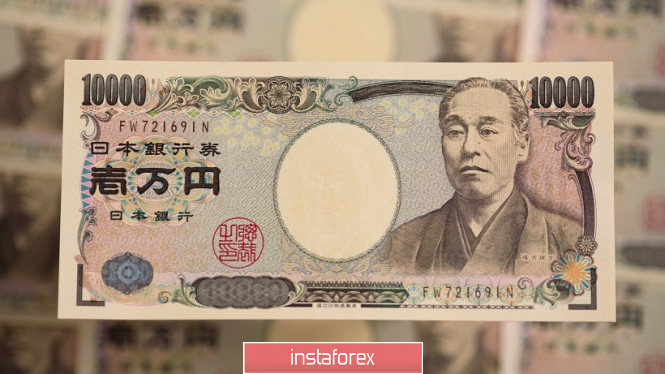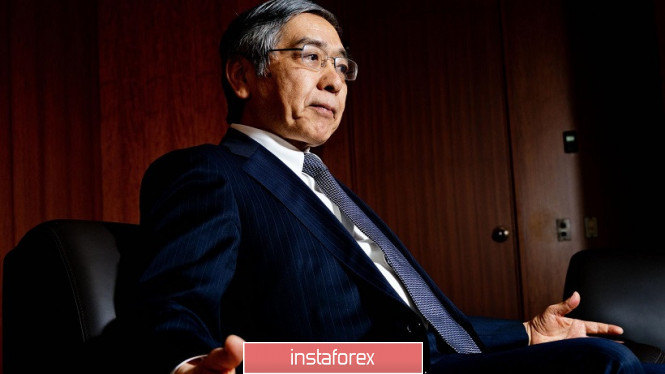The Japanese currency has gradually lost ground against the US dollar since the beginning of October: the yen has fallen in price by 200 points since October 7, reaching the boundaries of the 109th figure. But here the upward impulse has faded: the USD/JPY pair pair has been trading in a narrow-band flat since the beginning of the week, waiting for news drivers.
A regular meeting of the Bank of Japan will be held on Thursday, October 31st. On the eve of this event, an insider appeared on the market - obviously not in favor of the Japanese currency. According to Bloomberg news agency, the central bank will release a quarterly report tomorrow that will lower forecasts of economic growth and inflation. According to informed sources, this will be done in view of lower energy prices, and also taking into account the negative consequences of the global trade war, which affected the dynamics of global economic growth.

The worsening economic forecasts does not mean that the Bank of Japan will immediately begin to soften the parameters of monetary policy: at the September meeting, the central bank announced that it would keep the rate at the current level "at least until the end of February next year". At the same time, Haruhiko Kuroda warned that the regulator may soon consider the issue of increasing incentives. According to him, his colleagues are "close to this like never before this year."
It is also worth recalling that back in July last year, the Bank of Japan expanded the range, or rather, the limits of long-term interest rates: as a result of this correction, the regulator shifted not only the "ceiling", but also the lower limit, to -0.2%. In other words, Kuroda even then paved the way for a possible reduction in interest rates further into the negative area. In addition to a direct reduction in interest rates, the central bank may warn of a decrease in the target for long-term rates, as well as intensify asset purchases, while accelerating the expansion of the monetary base. The above scenarios can be combined.
In general, traders of the USD/JPY pair have a difficult time: the yen is forced to respond not only to the internal fundamental background, but also to the external. Currency is a defensive asset, therefore, the external fundamental background plays a significant role, and the USD/JPY pair traditionally depends on the degree of anti-risk sentiment in the market. This means that significant global changes can overshadow the outcome of the October meeting of the Bank of Japan.
At the moment, traders have two main topics on the agenda - this is Brexit and the trade war between the United States and China. The general fundamental background in the foreign exchange market depends on the prospects for their development, and, accordingly, the "health" of the yen. Any more or less large-scale breakthrough or failure in the negotiations will inevitably affect the dynamics of the USD/JPY pair. By coincidence, the October meeting of the Bank of Japan will take place amid high-profile political battles in London, the outcome of which will be of crucial importance for Brexit.
Yesterday, the House of Commons of the British Parliament nevertheless agreed with the proposal of Prime Minister Boris Johnson to hold early elections in mid-December. Labour could not convince their colleagues to postpone the election from December 12 to 9, and the Parliament simply voted for a re-election by a simple majority. But the foreign exchange market actually ignored this fact. The fact is that the deputies of the Lower House have not yet put an end to this issue - there is still a decisive, third reading of the bill. Today, that is, on Wednesday, the House of Lords (Upper House of Parliament) will consider the draft re-election law, after which it will return to the House of Commons. A decisive vote will take place at this stage.
Amendments will be presented to the bill before the third reading. Yesterday, Deputy Speaker Lindsay Hoyle did not allow deputies to vote on amendments unacceptable to the government (the chairperson has the right to select amendments and put them to a vote). At the same time, the House of Commons voted so that the deputies had the opportunity to introduce additional amendments to the draft law, which will be discussed during the third reading. Traders fear that Johnson's unacceptable amendments to the law will block re-election. Downing Street has already announced a possible revocation of the bill if such amendments are approved, in particular to reduce the age limit for voting in elections to 16 years.

It is worth noting that in this case, it is not so much a re-election to the British Parliament as the fate of Brexit is at stake: given the current ratings of Conservatives, they will be able to form their own majority in the House of Commons in December and, accordingly, coordinate Johnson's deal. Thus, in the coming days in the foreign exchange market we can expect increased volatility, and not only in pairs with the participation of the pound. If early elections are agreed, interest in risk in the market will increase, and the demand for defensive assets, including the yen, will decrease.
Thus, if the Bank of Japan takes an extremely soft position tomorrow (which is likely), and the British deputies finally come out for re-election (here the probability is 50/50), then the yen will continue to become cheaper, including paired with the dollar. In this case, the pair will reach the first resistance level at 109.50 in a matter of hours - this is the upper line of the Bollinger Bands indicator, which coincides on the weekly chart with the lower boundary of the Kumo cloud.
The material has been provided by InstaForex Company - www.instaforex.com